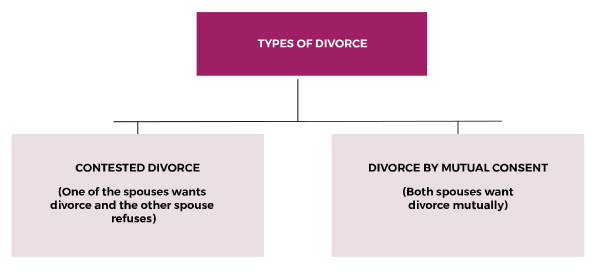The Hindu Marriage Act (HMA).
Anyone who is married under the Hindu Marriage Act. See Hindu Marriage for who can marry under the Hindu Marriage Act.

CONTESTED DIVORCE
If it is a contested divorce, you have to file it under any of the grounds give below. Unfortunately, there is no provision for divorce when one spouse wants a divorce but none of the grounds below exists (known as no-fault divorce). If only one spouse wants a divorce, it has to be filed under some ground.
A Hindu woman can divorce her husband on any of the following grounds (Section 13, HMA):
Note: The grounds marked with ** are available exclusively to the wife.
The husband can file a divorce against his wife on the same grounds as listed above. However, the grounds marked with ** are available only to the wife. These are conviction for an offence, child marriage and failure to pay maintenance.
Divorce by mutual consent is when both the husband and wife agree to get divorced mutually. They do not need to make any allegations against the other spouse. It is important that both the spouses also agree on the terms of the divorce such as maintenance, child custody, etc.
If both husband and wife want a divorce, they can file for divorce by mutual consent, by following the conditions below.
Remember: This period of 6-18 months is in addition to the one-year waiting period to file a divorce
You must file your divorce petition in the District Court which has jurisdiction over the place where:
Any spouse can file for a divorce only after 1 year of marriage, irrespective of the type of divorce- whether contested or mutual. The court will allow for filing a divorce before 1 year only in exceptional, circumstances where either spouse if suffering extreme hardships, based on the facts and circumstances of the case. (Section 14, HMA)
Either spouse can file for a divorce, in case of a contested divorce. In case of divorce by mutual consent, both spouses need to file the petition together.
If it is a divorce with mutual consent, it may take around 6 months-1 year. If it is a contested divorce, it may take around 2-3 years. The exact time will depend on the number of issues involved. For example, what allegations are made, how hard the other party is opposing the divorce, custody, maintenance and alimony, etc. The more the issues, the longer it will take. However, during the pendency, the court may grant you interim (temporary) orders(glossary) for matters such as custody( Hindu Custody) and maintenance( Maintenance and Alimony).
Remember- In a case of divorce, the court has the power to grant judicial separation instead of divorce (See Judicial Separation). The court will do this if it believes that there is scope to revive the marriage, or if one of the spouses asks for separation instead of divorce and the court finds it reasonable. The parties can always opt for divorce after judicial separation.
There is no definition of cruelty under the Hindu Marriage Act. Cruelty has been defined under Section 498A, Indian Penal Code ( Cruelty). Cruelty under criminal law has a more specific and serious definition. However, when it comes to cruelty under divorce law, the courts interpret the meaning on a case to case basis, depending on the facts and circumstances (ranging from physical violence to ‘my partner is quarrelling with me too much’ to ‘my wife does not take care of my parents’).
Cruelty can be physical or mental. You can understand what constitutes cruelty under other laws, here- Domestic Violence and Cruelty.
Remember: In case of cruelty, apart from divorce, you can also file a criminal case (See Cruelty) and a case for domestic violence (See Domestic Violence).
Yes, even if the husband’s relatives are treating the wife with cruelty, she can file for a divorce under cruelty. The courts interpret what cruelty is on a case to case basis.
Remember: In case of cruelty, apart from divorce, you can also file a criminal case (See Cruelty) and a case for domestic violence (See Domestic Violence) against your husband and the relatives who treat you with cruelty.
Yes, under the Hindu Marriage Act, both spouses can file for divorce against the other spouse on grounds of cruelty. So even your husband can allege cruelty against you and file for divorce.
Practical tip: Usually, when you file for a divorce, it is common for the husband to make allegations of cruelty such as, ‘she would not take care of the house’ or ‘she would not cook food.’ You don’t need to worry about all this, as courts know how to identify the truth. Also, not taking care of the house or not cooking does not amount to cruelty, as it is not the woman’s duty alone to do so, especially if she is also working outside the house.
Please note: This information has been made available to you for your benefit on an ‘as is’ basis, and is only for your information. It does not constitute legal advice and cannot substitute professional legal advice. Our disclaimer policy can be viewed here ( disclaimer policy)
